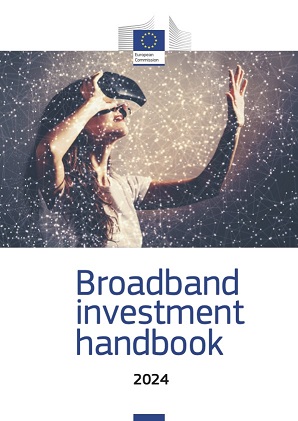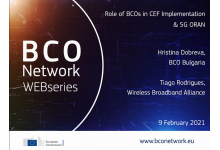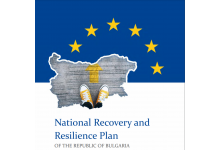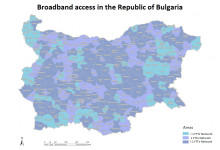Broadband connectivity
Тhe European Commission has monitored Member States’ progress in digital and published annual Digital Economy and Society Index (DESI) reports. The DESI Index ranks Member States according to their level of digitalisation and analyses their relative progress over the last five years, considering their starting point.
In accordance with the Commission Recommendation (EU) 2020/1307 of 18 September 2020, the Member States reported to the Commission on the progress they have made one year into implementing the 39 best practices of the Connectivity Toolbox.
The European Broadband Competence Offices Network (BCO Network) Support Facility has published its 2022-2023 Annual Work Plan Summary, outlining the key activities and topics for this year’s knowledge exchange and capacity building programme.
The study on investing in Gigabit connectivity results in several suggestions on how to encourage private investment in digital infrastructure to reach the connectivity targets.
Connectivity for the digital transformation
The 5G for CAM Working Group of the 6G Smart Networks and Services Industry Association present this contribution to the ongoing global brainstorming on 6G by providing our initial views on what 6G might look like and what implications this will have for CAM. The paper reflects on the lessons learnt during the execution of the key 5G PPP projects which have been working on 5G for CAM and contribute to identifying, from the very beginning, new mobility requirements for the evolution of 5G and 6G communication systems.
The Commission is publishing for consultation the draft revised Guidelines on State aid for broadband networks (the ‘Broadband Guidelines’).
The public consultation is open from 19 November 2021 to 11 February 2022.
The revision aims to clarify the existing State aid rules and ensure they take account of the latest market and technological developments.
The proposed targeted revision of the Guidelines consist of:
The event entitled "Working together for connectivity" took place online on October 26, 2021. The Annual Conference marked the BCO Network's five-year milestone and everything achieved in this period, working in the specialized Support Mechanism of the European Commission.
The participants reported the success and intensive activities of the Network with a large number of members and conducted over 55 specialized trainings on various topics in the field of connectivity.
On 25 March 2021, the Member States, in close cooperation with the Commission, agreed on a Union-wide Connectivity Toolbox, pursuant to the Connectivity Recommendation of 18 September 2020. The Toolbox consists of a set of best practices that are considered as the most efficient in allowing and encouraging operators to roll out very high capacity networks.
On February 9, 2021, was held a seminar of the Broadband Competence Offices (BCO) Network, at which representatives of the National Broadband Competence Office (BCO Bulgaria) were invited to share experience and good practices in promoting the initiative of the European Commission WiFi4EU developed under the Connecting Europe Facility (CEF) to build free high-speed and high-quality wireless internet connection in public areas.
The Broadband Cost Reduction Directive aims to facilitate and incentivise the roll-out of high-speed electronic communications networks by lowering the costs of deployment with a set of harmonised measures.
The Commission is carrying out an evaluation of the current measures under the Broadband Cost Reduction Directive and an impact assessment of a new Commission legislative proposal.
This public consultation aims to gather stakeholders’ views on the implementation of the Directive.
The new Recovery and Resilience Facility will provide large-scale financial support for Member States' reforms and investments to mitigate the economic and social impact of the COVID-19 pandemic, and to make EU economies more sustainable, resilient to shocks and better prepared for the challenges of environmental and digital transition.
The COVID-19 crisis has shown that connectivity is essential for people and businesses in the Union. Electronic communications networks, in particular very high capacity networks, have been playing a crucial role in the response to the crisis by enabling remote working and schooling, healthcare, and personal communication and entertainment. Widespread gigabit connectivity underpins bandwidth-intensive use cases in the fields of health, education, transport, logistics, and media, which can play a key role in Europe’s economic recovery.
The European Commission is announcing a public consultation about the implementation evaluation of EU Guidelines for the application of State aid rules in relation to the rapid deployment of broadband networks (the Broadband Guidelines, the Guidelines). The consultation is addressed in particular to organisations, public authorities, regulators and others who apply the the State aid rules for the deployment of broadband infrastructure, but all citizens are welcome to contribute to this consultation.
By Decision No 555 and Decision No 556 of the Council of Ministers of 6 August 2020, an updated National Broadband Infrastructure Plan for Next Generation Access "Connected Bulgaria" and an Updated policy in the field of electronic communications of the Republic of Bulgaria were adopted.
Broadband is recognised by the European Commission as one of the main tools for improving of the economic and social well-being of the population. It is becoming an increasingly important factor not only for the competitiveness of the enterprises, but also for supporting social inclusion and enables the development and use of e-government services. The spread of high-speed connectivity can lead to a significant increase in gross domestic product, employment, the competitiveness of national economies on the international scene and the quality of life.
Current information about the existing private and public infrastructure and quality of service while using a standard indicators for "mapping" a broadband networks, including about the needs of sectors, with specific demands
Under the "Rural Development Programme" 2014-2020, BGN 60 million shall be allocated, for connection to the Single Electronic Communication Network of the State administration of the municipal centres falling under the so-called "white or grey areas", according to the "Community Guidelines for the application of State aid rules in relation to rapid deployment of broadband networks" (the Guidelines).
This handbook aims to assist public authorities in planning, implementing, and monitoring broadband projects within their territories.

The Single Information Point (SIP)
The Single Information Point (SIP) has been developed within the framework of the project "Building a GIS based electronic platform "Single Information Point", financed under the Operational Program "Good Governance" (OP GG). SIP is built in accordance with the provisions of the Directive 2014/61/EU of the European Parliament and of the Council and the Electronic Communication Networks and Physical Infrastructure Act (ECNPIA).
SIP is available on the following address: https://sipbg.gov.bg/
For contacts and questions, please email us on the following address: EkipEIT@mtitc.government.bg.









